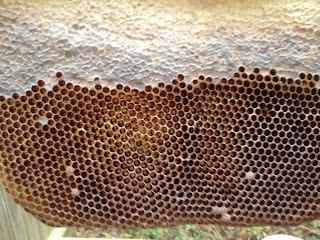The Beehive Postmortem
As I alluded to ever-so-briefly in my previous post, our bee colony has collapsed. Through October they seemed to be doing fine, but when I checked in on a warm day earlier this month, it was eerily quiet. No bees at all at the entrance, and no humming of activity.
I opened the hive to find lots of gorgeous combs of capped honey, but no bees at all. No living ones, anyway. There were a few dead ones on the floor of the hive, and that was it. Thousands of bees had simply vanished into thin air.
Later we went through the hive to take some photos to send to our bee mentor for some insight on what could have happened to the colony. Here's what we found:
Lots of comb that should have brood cells (baby bees in the comb) had nothing at all. The cells at the top are capped honey for winter, but the ones at the bottom have only a very spotty brood pattern (the parts that look like closed dots in the honeycomb). There are no eggs in the comb either, a sign that our queen "failed," meaning that she died and wasn't replaced.
It's also possible that are bees were robbed by meaner, non-honeybees from another hive. If they were weakened, they may have given up and flown away. The damage above is more likely from from a mouse, though, which got in and ate a lot of beeswax between the time I noticed the bees were gone and when we took the photos. We can tell because the entrance was definitely rodent-chewed in that time:
Though many of the dead bees we saw looked completely normal, some of them looked more like this guy:
His blackened body suggests disease, but his little tongue sticking out is a classic sign of pesticide poisoning. Though we don't use any pesticides, we (alas) can't control everyone around us. Bees fly far and wide to forage, and if a percentage of them succumbed to pesticides, it could weaken the group going into winter. Worse, they can bring the pesticides back in pollen for the otters, making the problem much bigger.
We're hoping for more information from someone far more expert than we are, but it the meantime, we've brought the honey combs indoors to keep from losing them to critters who've been emboldened now that there's no risk of being stung. We also boarded up the entrances to protect the existing comb. This will allow our bee mentor to look it over, and if it can be salvaged, we'll save some comb to get a new group of bees off to a good start next spring. I'll post more information if we ever get a cause of death.
This is all incredibly disappointing, and this year's losses continue to pile up around us. It does seems to be a calculated risk to keep bees these days, so all we can do is try again next year.







Comments
Post a Comment